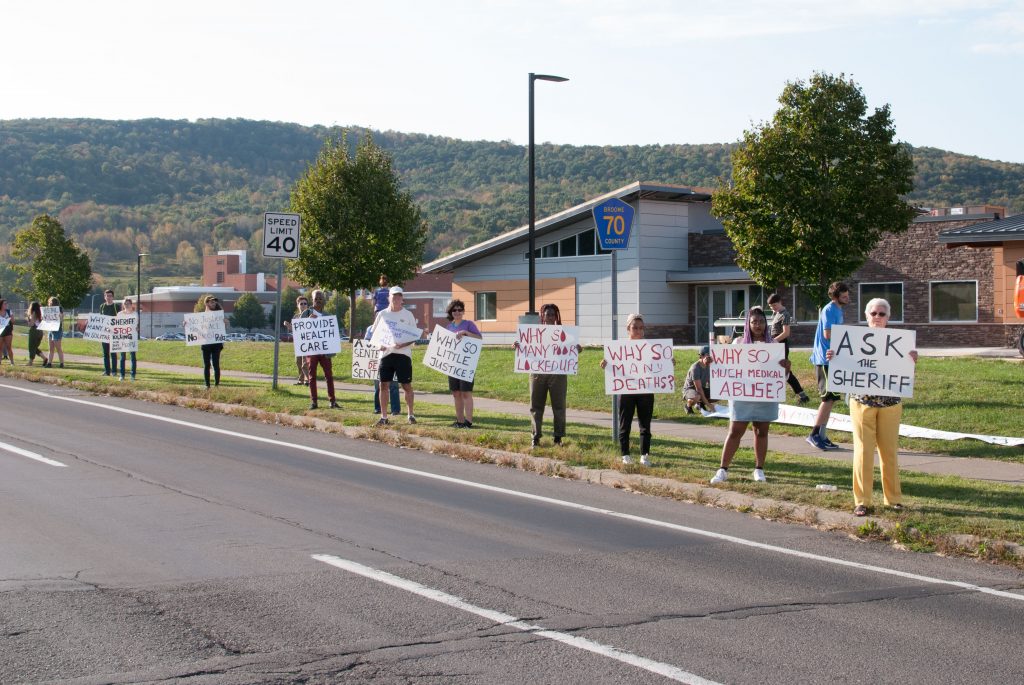“Why so little justice?” “Why so many deaths?” “Why so many poor locked up?” “Why so much medical abuse?”
These were the messages on signs held by protesters on the corner of Front Street and Lt. Vanwinkle Drive in the Town of Dickinson on Wednesday evening, when roughly 40 community members and students rallied against what they said are inhumane conditions inside the Broome County Jail.
“We found a really horrific spate of deaths that have occurred in the jail ― four deaths in the last six years; that’s about six times the normal rate for a jail this size,” said Andy Pragacz, a member of Justice and Unity for the Southern Tier and a sixth-year graduate student studying sociology.

Binghamton resident Tinamarie Gunther, 43, said her husband was neglected, abused and beaten inside the jail.
“I was told that my husband’s medical conditions were made up,” Gunther said.
Less than a half-mile up the hill, outside the jail, a very different scene unfolded. In the parking lot, kids climbed in and out of military-style black humvees, watched K-9 dogs follow orders and tried on officers’ equipment before taking a tour of the jail with their parents.
The jail’s open house, according to protesters, was a response to recent negative publicity the Broome County Sheriff’s Department has received.
According to Broome County Sheriff David Harder, the jail has held an open house for 19 years — every year since he’s been in charge.
The protest came two months after the jail was sued by Legal Services of Central New York, a public-defenders group whose suit alleges juvenile inmates are routinely kept in solitary confinement for interminable periods after committing minor offenses.
According to The New York Times’ coverage of the suit, underage inmates are kept with “no meaningful human interaction, no education or programming, no music or television, and limited reading materials.”
Harder said his corrections officers don’t use the term solitary, instead referring to the disciplinary unit as Delta Pod, and that inmates are usually placed there for fighting.
“We don’t refer to it as that because it’s not a dark cell with a little peephole,” he said. “In fact, the cell is bigger than the one they’re in. So now, a group of lawyers and Legal Aid have decided to sue me for treating these people horribly. [The inmates] don’t behave, so we’re locking them up; if they behave, we take them back out.”

A main concern of the protesters was the lack of adequate medical treatment to which they say inmates have access.
Katie Smith, 24, of Binghamton was released from the facility in July and said she was denied a trip to the hospital after a fall in the shower left her with spinal cord damage.
“They came in and took my pulse and my blood pressure and told me I was fine, when they should have taken me to the hospital just to make sure nothing else had happened,” Smith said. “Now, when I turn my head, I literally can’t see; it’s all blurry.”
Karla Marte, a sophomore majoring in integrative neuroscience, attended the protest with the College Progressives. She said wants students to realize the problems of mass incarceration exist on the local level.
“People tend to see it as something very distant and far removed, but it’s here in Broome County ― it’s happening,” Marte said. “Black people, disabled people and poor people being disproportionately incarcerated.”
Numerous protesters also noted what they called an inhumane bathroom situation for female inmates, in which they are visible to male corrections officers.
“Those toilets are within 10 feet of where the girls eat their dinner, so that’s disgusting and humiliating, and the [corrections officers] can literally walk by them and see them using the toilet,” said Alexis Pleus, 34, of Windsor. “It’s horrific; it’s really not humane at all and really improper.”
Harder didn’t dispute this depiction of the bathroom facilities, saying it was necessary for the direct supervision structure of the jail.
“The bathrooms are semi-private because we have to be able to make sure that nothing’s going on in there,” he said. “I mean, we don’t go down in there and stare at them when they’re going to the bathroom, we generally have an idea.”
The Broome County Jail can house up to 600 inmates; 517 beds were occupied the morning of the open house and protest.



